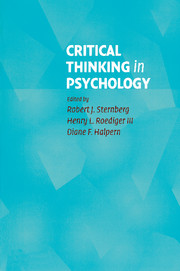Book contents
- Frontmatter
- Contents
- List of Illustrations and Tables
- List of Contributors
- Preface
- 1 The Nature and Nurture of Critical Thinking
- 2 Evaluating Experimental Research
- 3 Critical Thinking in Quasi-Experimentation
- 4 Evaluating Surveys and Questionnaires
- 5 Critical Thinking in Designing and Analyzing Research
- 6 The Case Study Perspective on Psychological Research
- 7 Informal Logical Fallacies
- 8 Designing Studies to Avoid Confounds
- 9 Evaluating Theories
- 10 Not All Experiments Are Created Equal
- 11 Making Claims in Papers and Talks
- 12 Critical Thinking in Clinical Inference
- 13 Evaluating Parapsychological Claims
- 14 Why Would Anyone Do or Believe Such a Thing?
- 15 The Belief Machine
- 16 Critical Thinking and Ethics in Psychology
- 17 Critical Thinking in Psychology
- Author Index
- Subject Index
- References
2 - Evaluating Experimental Research
Critical Issues
Published online by Cambridge University Press: 05 June 2012
- Frontmatter
- Contents
- List of Illustrations and Tables
- List of Contributors
- Preface
- 1 The Nature and Nurture of Critical Thinking
- 2 Evaluating Experimental Research
- 3 Critical Thinking in Quasi-Experimentation
- 4 Evaluating Surveys and Questionnaires
- 5 Critical Thinking in Designing and Analyzing Research
- 6 The Case Study Perspective on Psychological Research
- 7 Informal Logical Fallacies
- 8 Designing Studies to Avoid Confounds
- 9 Evaluating Theories
- 10 Not All Experiments Are Created Equal
- 11 Making Claims in Papers and Talks
- 12 Critical Thinking in Clinical Inference
- 13 Evaluating Parapsychological Claims
- 14 Why Would Anyone Do or Believe Such a Thing?
- 15 The Belief Machine
- 16 Critical Thinking and Ethics in Psychology
- 17 Critical Thinking in Psychology
- Author Index
- Subject Index
- References
Summary
[T]he application of the experimental method to the problem of mind is the great outstanding event in the study of the mind, an event to which no other is comparable.
The author of this quote is Edwin G. Boring (1886–1968), one of the great psychologists of the 20th century and author of A History of Experimental Psychology (1929; the quote comes from p. 659). Contemporary psychologists take “the psychology experiment” as a given, but it is actually a relatively recent cultural invention. Although fascination with human behavior is doubtless as old as the emergence of Homo sapiens, the application of experimental methods to the study of the human mind and behavior is only 150 or so years old. Scientific methods, with heavy reliance on experimental technique, arose in Western civilization during the time of the Renaissance, when great insights and modes of thoughts from the ancient Greek, Roman, and Arab civilizations were rediscovered. The 17th century witnessed the great discoveries of Kepler, Galileo, and Newton in the physical world. Interest in chemistry and biology arose after the early development of physics. Experimental physiology arose as a discipline in the late 1700s and early 1800s. Still, despite great advances in these fields and despite the fact that scientists of the day usually conducted research in many different fields, no one at that time performed experiments studying humans or their mental life. The first physiologists and anatomists mostly contented themselves with the study of corpses.
- Type
- Chapter
- Information
- Critical Thinking in Psychology , pp. 15 - 36Publisher: Cambridge University PressPrint publication year: 2006



